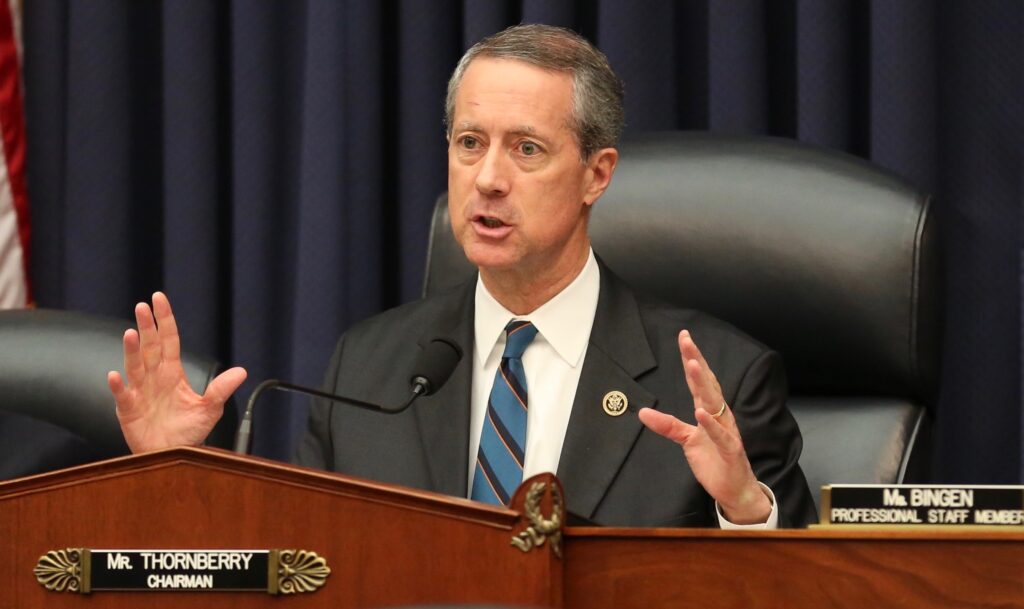Thornberry Compromises: $631B For Defense
Posted on

Rep. Mac Thornberry
UPDATED: Harrison says Senate Dems are key CAPITOL HILL: The House Armed Services Committee will propose $631.5 billion in funding for defense, HASC staff told reporters this afternoon. That is about 1.4 percent less than the $640 billion HASC chairman Mac Thornberry and his Senate counterpart John McCain campaigned for, but it’s also 4.7 percent above President Trump’s request for $603 billion, which both legislators denounced as inadequate.
(Both HASC and the administration provide another $65 billion for war funding, aka Overseas Contingency Operations or OCO funds. To add to the confusion, $10 billion of Thornberry’s $631.5 billion for base-budget needs is actually labeled OCO, purely as a technicality to evade Budget Control Act caps).
In short, it’s a compromise. It’s not a bad one for defense hawks, since the budget hawks came more than halfway. The question is, will it hold?
How fluid the numbers have become was underscored by HASC’s own trouble scheduling the briefing, originally set for Friday and then repeatedly pushed back, rumor has it, to give more time for negotiations.
“Some of those negotiations are still ongoing,” said the HASC staffer. “The budget committee is waiting to mark up.”
The House appropriations subcommittee on defense (HAC-D), meanwhile, voted $584.2 billion for the base budget, plus $73.9 billion in OCO. Ultimately, it’s the appropriators that make the final decision on what gets funded or not. HASC staff were quick to point out HAC-D doesn’t have exactly the same jurisdiction they do — for example, HASC votes funding on the nuclear weapons activities of the Energy Department, while HAC-D does not — so it’s normal for the HAC-D total would be lower.
To make life even more exciting, all of these numbers violate the Budget Control Act, which sets strict caps on both defense and non-defense spending. Members of both parties revile the BCA and have in the past managed to make short-term compromises, lifting the caps for a couple of years at a time, but no such compromise is in place for 2018.

Todd Harrison
[UPDATE BEGINS] There’s a big missing piece of this grand bargain, warned one of the capital’s leading budget analysts, Todd Harrison of the Center for Strategic & International Studies. “While it’s interesting that Republicans seem to have hammered out a compromise among themselves, the compromise that ultimately matters is the one they negotiate with Democrats in the Senate to get the 60 votes needed to raise the BCA budget caps,” Harrison told me. “Without that, the marks by the (House) authorizers and appropriators don’t mean much.”
“I’m not nearly as dismissive as Todd on this one,” said Mackenzie Eaglen, a former GOP Hill staffer now with the American Enterprise Institute. “This is a major step forward for the GOP. Defense versus deficit hawks have been divided for the past decade. But the tide has clearly shifted in favor of defense hawks, who have the votes to get what they want after being outnumbered for years.”
“While this is all funny money until there is a deal to amend or repeal the Budget Control Act, it is significant for a variety of reasons,” Eaglen told me:

Mackenzie Eaglen
- “It shows the GOP is not at war with itself and can find a compromise between the two factions.
- “It helps Leadership get a budget, which they need for tax reform.
- “Congress is showing they’re fed up with the status quo. And as you can see from my budget paper out today, President Trump’s budget is really just a more muscular status quo. Congress is also focusing much of the additional money on procurement, which is what’s needed for a more balanced defense portfolio. A lot of this will stick no matter how appropriations get resolved for FY 2018.
- “This strengthens Leadership’s hands when they go to negotiate that BCA deal sometime later this year.
- “The Republican consensus that defense needs to grow and by a number significantly higher than President Trump has proposed also indicates that if there’s a deal to amend BCA, it will be more than the Band-Aids of the past for the Pentagon.”
[UPDATE ends]
Thornberry had said previously he’d be willing to compromise on the $640 billion figure if he got assurances of long-term stability for defense funding — a deal that guaranteed adequate funding beyond the current year. “What the chairman said last week absolutely still holds,” a staffer said. “He wouldn’t have put out the mark at this level if he wasn’t comfortable about the trajectory of these discussions. (It) reflects the chairman’s optimism that we will see real growth.”
Subscribe to our newsletter
Promotions, new products and sales. Directly to your inbox.
